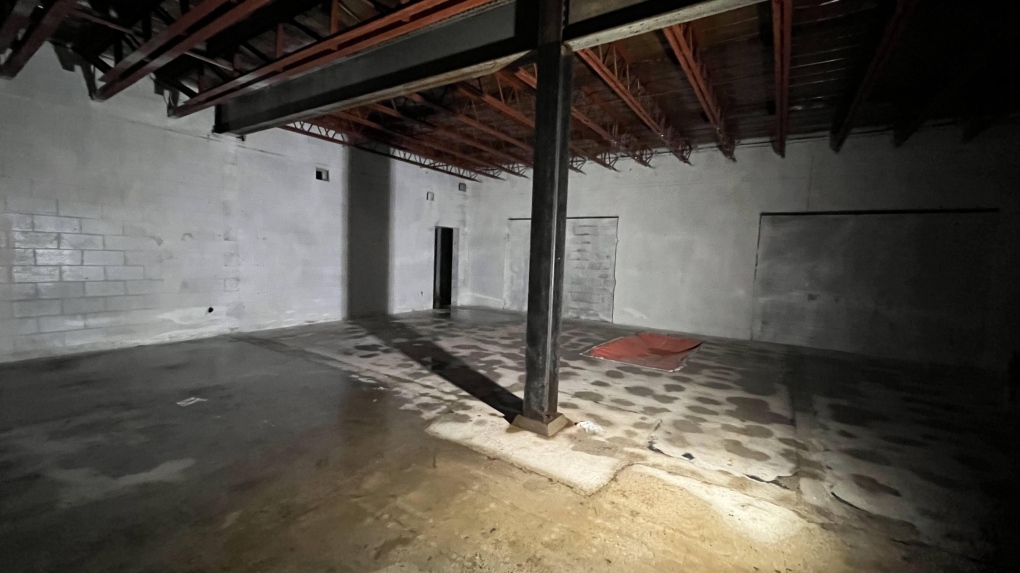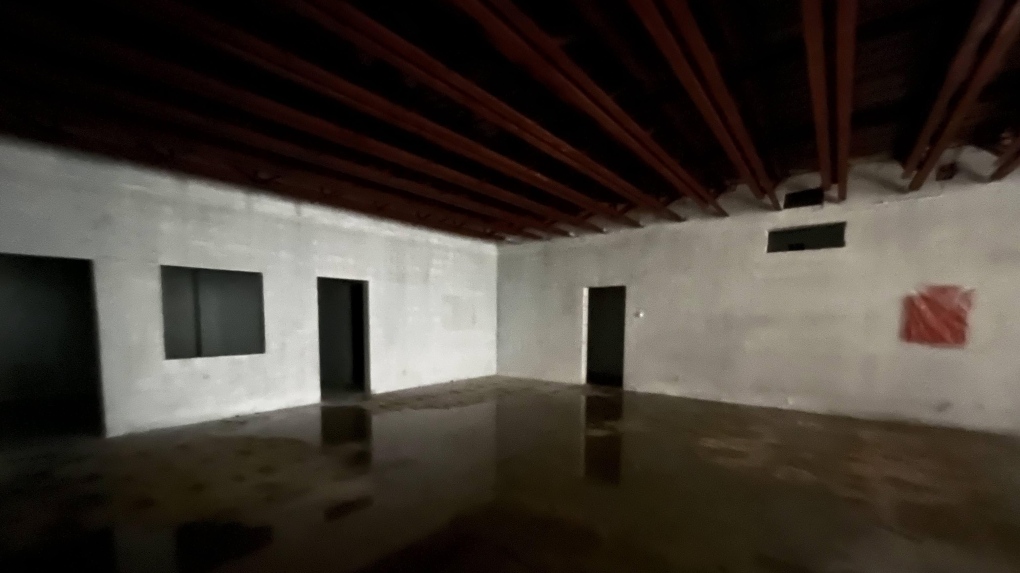Region to chart a new course for its Cold War-era bunker
Remediation work on the Region of Waterloo’s nuclear bunker is now complete, but what’s next for the Cold War-era building is yet to be decided.
Repairs to stabilize the nearly 60-year-old structure in Kitchener’s Schneider Park wrapped up earlier this month. The $700,000 project, which the region says came in under budget, included the removal of hazardous materials like lead, asbestos and mold, the rehabilitation of the roof, and waterproofing measures.
“People can safely be inside now,” said Helen Chimirri-Russell, the Region of Waterloo’s director of cultural services.
“Before, you’re getting kitted-up with a hard-core mask and your Tyvek suit and your special gloves to go into that space, and now we’re in a place where you can just go in there with a flashlight. So we’re really excited about that.”
Built in 1966 at the height of the Cold War, the 5,700 square foot bunker was designed to accommodate about 40 people for several weeks and had built-in heating, water and sewage systems.
Called the Municipal Emergency Government Headquarters (MEGHQ), the shelter was to house government officials, staff and engineers who could keep the Waterloo County government going in the event of a nearby nuclear attack.
It was never used and decommissioned in 1992.
In subsequent years the bunker was used by community groups, including as storage space for a local rowing club, before the presence of asbestos and mold was discovered within the building, forcing them to vacate in 2018.
 A view inside one of the bunkers rooms, post-repairs. (Submitted/Region of Waterloo)
A view inside one of the bunkers rooms, post-repairs. (Submitted/Region of Waterloo)
WHAT COULD THE BUNKER BE?
The region did some community engagement on potential future uses for the bunker in 2021.
Chimirri-Russell said some of the ideas submitted included a museum, community gathering space, film location or even – as one person suggested – a place “people could put their cheese to mature.”
“There's a certain amount of carte blanche and blank canvas to it,” Chimirri-Russell said. “It's being able to put our imaginations to, what does our community need? What does the region need? Where do those things intersect?”
Chimirri-Russell pointed to a bunker in Russia that doubles as a museum and nightclub, another in Albania which serves as a hamburger joint, and a former fallout shelter in England which is now a subterranean farm.
 The bunker has multiple rooms, a kitchen, dormitories and bathrooms. (Submitted/Region of Waterloo)
The bunker has multiple rooms, a kitchen, dormitories and bathrooms. (Submitted/Region of Waterloo)
While there was a rush to complete repairs before the bunker deteriorated further, now that it’s stabilized, Chimirri-Russell says there’s not necessarily the same time pressure to determine what comes next.
The region is planning another round of community engagement sometime later this year.
“[We’ll] pull together the information we’ve already gathered and then go out with a bit more of a structured conversation to the community about how this really unique structure in a very beautiful and special location might be useful and usable,” Chimirri-Russell said.
SOMETHING 'WORTH HANGING ON TO'
Chimirri-Russell said while many municipalities created bunkers during the Cold War, most have since been destroyed.
“So there's something beautiful about the fact that ours has survived,” Chimirri-Russell said. “And there's this unique opportunity to be able to lean into everything that brought that building into being, this sense of community coming together.”
According to the region, the bunker is believed to the only example of a purpose-built Municipal Emergency Government Headquarters (MEGHQ) still in existence and in government ownership in Canada.
"This is something that's worth hanging on to, and worth keeping for future generations. So we can continue to have all these really rich conversations about what that period of time meant, both the good and how our community came together, and also the more challenging pieces about what it meant to be part of something as gargantuan as a Cold War," Chimirri-Russell said.
CTVNews.ca Top Stories

Air traveller complaints to Canadian Transportation Agency hit new high
The Canadian Transportation Agency has hit a record high of more than 71,000 complaints in a backlog. The quasi-judicial regulator and tribunal tasked with settling disputes between customers and the airlines says the backlog is growing because the number of incoming complaints keeps increasing.
LIVE @ 1:15 PT B.C. premier to give announcement related to public drug use
B.C.'s premier is scheduled to give an update Friday about public drug use in the province.
Orca calf that was trapped in B.C. lagoon for weeks swims free
An orca whale calf that has been stranded in a B.C. lagoon for weeks after her pregnant mother died swam out on her own early Friday morning.
AFN chief says Air Canada offered a 15% discount after her headdress was mishandled
After the Assembly of First Nations' national chief complained to Air Canada about how staffers treated her and her ceremonial headdress on a flight this week, she says the airline responded by offering a 15 per cent discount on her next flight.
Sophie Gregoire Trudeau on navigating post-political life, co-parenting and freedom
Sophie Gregoire Trudeau says there is 'still so much love' between her and Prime Minister Justin Trudeau, as they navigate their post-separation relationship co-parenting their three children.
Flight attendant indicted in attempt to record teen girl in airplane bathroom
An American Airlines flight attendant was indicted Thursday after authorities said he tried to secretly record video of a 14-year-old girl using an airplane bathroom last September.
76ers All-Star centre Joel Embiid says he has Bell's palsy
Philadelphia 76ers All-Star centre Joel Embiid has been diagnosed with Bell’s palsy, a form of facial paralysis he says has affected him since before the play-in tournament.
DEVELOPING Bird flu outbreaks: WHO weighs in on public health risk
The current overall public health risk posed by the H5N1 bird flu virus is low, the World Health Organization said on Friday, but urged countries to stay alert for cases of animal-to-human transmission.
Island near Mull of Kintyre for sale for US$3.1 million
An idyllic 453-acre private island is up for sale off the west coast of Scotland and it comes with sandy beaches, puffins galore, seven houses, a pub, a helipad and a flock of black-faced sheep.




























